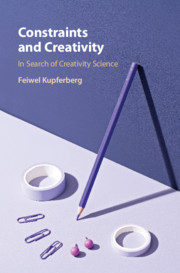
- Publisher:
- Cambridge University Press
- Online publication date:
- July 2021
- Print publication year:
- 2021
- Online ISBN:
- 9781108884617
- Subjects:
- Psychology, Cognition, Educational Psychology

This book studies creativity in its own right in the search for a creativity science. If we assume that creativity can best be described by constraint theory, the complexity and paradoxes of creativity can be reduced by dividing it into manageable sections. The model is tested and evidenced by numerous historical cases of pioneering work within the three intellectual fields: science, art, and technology. The model guides non-specialists from the many disciplines studying creativity and demonstrates the first principles of creativity science. Going all the way back to Aristotle, the author makes the basic ideas of the original founder of creativity science accessible and up to date with current research.
‘In this stimulating and thought-provoking book, Feiwel Kupferberg lays the groundwork for a whole new science of creativity, born in a multidisciplinary landscape and with a keen focus on constraints. It is a must-read for everyone interested in explaining creativity in context.’
Lene Tanggaard - Professor in Educational Psychology, Aalborg University and Rector of the Kolding Design School, Denmark
‘… filled with fascinating examples from science, the arts, technology, rhetoric, and the natural world. The author covers trends, particularly in creative domains, focusing on, e.g., the advent of photography and its effect on the visual arts and the emerging movie industry and how in the 20th century, movies targeted a wide audience while visual art became increasingly incomprehensible … all fields of endeavor afford levels of creativity from childhood exploration to pioneering work … Recommended.’
R. F. Subotnik Source: CHOICE
 Loading metrics...
Loading metrics...
* Views captured on Cambridge Core between #date#. This data will be updated every 24 hours.
Usage data cannot currently be displayed.